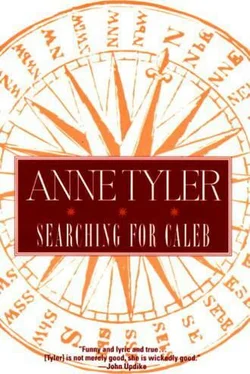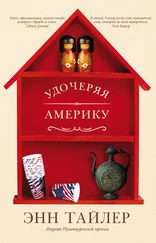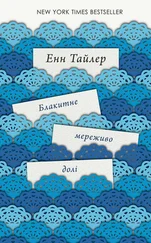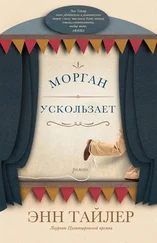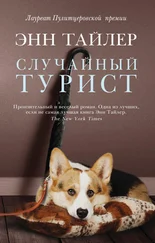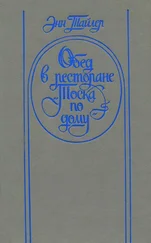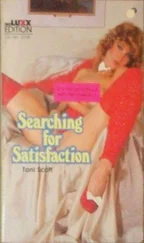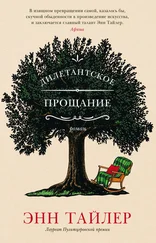“That’s what you’re going to tell your daughter?” Duncan said. “Just accept whatever comes along? Endure? Adapt?”
“Well—”
“And how would people end up if they all did that?”
Justine hesitated.
“Never mind, Mama,” Meg told her. “I didn’t mean to mention it, anyway.”
So Justine got into the car, but untidily and with backward glances because so much seemed still unsettled. The troubled feeling was nagging at her mind again. She couldn’t quite put her finger on it. She felt as if she had mislaid an object somewhere, something important that would thread through all her thoughts until she found it. But she sat forward briskly and called out the window, “Meggie darling!”
“What is it?”
“If you do have to do bazaar work, you know, if you need any help, I’ll be happy to drive down any time and tell fortunes.”
“Thank you, Mama.”
“You know I have a lot of steady clients here.”
“Well, that’s very nice of you, Mama,” Meg said. But Justine could tell that she had made a mistake. She should have offered something plainer and sturdier — anything but more gifts from heaven.
* * *
By the time they reached Caro Mill it was night, and the streets had a dismal abandoned look. The only place open was the diner, eerily lit and vacant except for Black Emma swabbing the counter. “Maybe we could stop for coffee,” said Justine. But the car slid by, and neither Duncan nor her grandfather answered. (They had not spoken all the way home, either one of them. Only Justine had chattered on and on until she wondered herself when she would shut up.) “Duncan?” she said. “Couldn’t we stop for coffee?”
“We have coffee at home.”
“I don’t want to go home,” she said. “I have this peculiar feeling. I wouldn’t mind staying the night somewhere, even. Duncan?”
But he said, “ Endure, ” and turned sharply down Watchmaker Street. She blinked and looked at him.
In front of their house, when the engine had died and the headlights had faded, the three of them sat motionless for a moment gazing through the windshield, as if being borne along on some darker, more silent journey. Then Justine touched her grandfather’s arm. “Here we are,” she said.
“Eh?”
He stumbled out, latching the door inconclusively behind him, and Justine slid after Duncan out the driver’s side. They went single file up the walk between looming rustling cornstalks. At the porch, they stopped short. A shadow unfolded itself from the steps. “Eli!” Justine said.
“Eh?” said her grandfather.
And Duncan said, “Well, Eli. What have you found for us?”
“Caleb Peck,” said Eli.

13
Eli Everjohn drank his coffee white, preferred Jane Parker angel food cake to taco chips, and was perfectly comfortable sitting on a chrome-legged chair in the kitchen. He had to make all that clear before they would let him get on with his report. “Listen here,” he kept saying. “Listen. It struck me right off—” But Justine would interrupt to ask, couldn’t she take his hat? wouldn’t he be cooler in his shirtsleeves? And old Mr. Peck trudged around and around him, thinking hard, occasionally offering interruptions of his own. “I believe I ought to fetch my notebook, Justine.”
“Yes, Grandfather, I would do that.”
“I believe that windowscreen is torn. Where else would these mosquitoes be coming from?”
“I’ll find the swatter.”
“Oh, leave it, leave it. Mr. Everjohn here has something he wants to say to us.”
But when Eli took a breath Justine halted him. “Wait, I’ve been wanting something sour all day . Don’t start without me.”
“ Justine— ” Duncan said.
Eli Everjohn was a patient man. (In his business, he had to be.) Still, he had been dreaming of this moment for a good long time now. He had come over on a Sunday evening expressly to bring this news, which he thought might cause him to burst if he left it till Monday: in just under three months, he had accomplished what a whole family could not do in sixty-one years. He had performed a spectacular piece of deduction, and now he wanted to tell about it in his own slantwise, gradual way so that everyone could admire how one clue had built upon another, one path led to the next, with sudden inspired leaps of the imagination to bridge them. True detective work was an art. Finding was an art. He was grateful to the Peck family for handing him this assignment. (How could he ever again settle for guarding anniversary gifts or pretending to read Newsweek in front of beauty parlors?) So he cleared his throat, and pushed his coffee cup a certain distance away, and plaited his long fingers on the table before him and began as he had planned. “It struck me right off,” he said, “that there was one thing the same in all accounts of Caleb Peck.”
“You’ll have to speak up,” said the old man.
“Oh. Sorry. It struck me—”
“Justine, I think my battery’s going.”
“Will you let the man speak? ” Duncan said.
So that Eli, with the last of his patience worn away, ended up blurting it out after all and ruining the moment he had planned for so long. “Mr. Caleb Peck,” he said, “is in Box Hill, Louisiana, alive and well.”
* * *
It had struck Eli right off that there was one thing the same in all accounts of Caleb Peck: he was a musical man. To his family that was only a detail, like the color of his eyes or his tendency to wear a Panama hat just a little past the season. But to Caleb, wasn’t it more? Eli pondered, sifting what he had heard and endlessly rearranging it. He traveled a few blind alleys. He scanned the alumni lists of several well-known music schools, including Baltimore’s Peabody Institute. He checked the family’s old phonograph records for performers whom Caleb might have been moved to seek out. He inquired as to Caleb’s piano teacher — someone young and pretty, maybe? Someone inspirational, to teach him those Czerny exercises he found crumbling away on top of the piano in old Mr. Peck’s Baltimore parlor? But no, the Czerny was Margaret Rose’s, said Mr. Peck. Caleb had not liked Czerny. He was not, to tell the truth, very fond of the classical mode. And he had never had a music teacher of any kind. Only little Billy Pope passing on his fiddle lessons, and a leatherbound book telling how to play the woodwinds (which in those days were really made of wood — see the ebony flute in Caleb’s old bedroom?) and for the piano, Lafleur Boudrault, who taught him ragtime.
Was this Lafleur Boudrault young and pretty, by any chance?
But Lafleur Boudrault was the Creole gardener, not pretty at all — a scar down one cheek and a permanent wink. Long dead now. Survived by his wife Sulie. He wouldn’t have helped out anyway: a cross-grained sort.
Eli traveled once again to Baltimore and sought out Sulie, who was moving a dustcloth around and around the attic. Nowadays all she did was dust. She would not give up her cloth, which had to be pried from her fingers in her sleep as you would pry a pet blanket from a child in order to wash it. And what she dusted was not helpful at all — never the furniture, which Lord knows could use a dusting, all those bulbs and scallops and crevices; but only the hidden places that didn’t count, the undersides of drawers and the backs of picture frames and now these trunks and cartons in the attic, which she had been on for weeks and weeks. They couldn’t get her to stop. They wanted to pension her off; didn’t she have family somewhere? They were almost certain there had been a daughter. But Sulie only laughed her cracked, rapid laugh and said, “ Now you wants to do it. Now you wants.” Oh, she was mad, no question about it. But Eli needed Caleb’s contemporaries and there were not all that many to pick and choose from. He climbed the narrow, hollow, pine-smelling steps to Laura’s attic, submerging first his head and then his shoulders and then his wool-wrapped body in a heat so intense that it seemed to be liquid, and at the last he was merely floating upward in a throbbing dull haze. He swam between crazed china hurricane lamps and slanted portraits, across rugs rolled and stacked like logs, toward the spindly figure briskly polishing an empty Pears soap box down where the dusty light fingered its way through the louvers. “Mrs. Sulie Boudrault?” he asked, and without looking up she nodded and hummed and went on polishing.
Читать дальше
